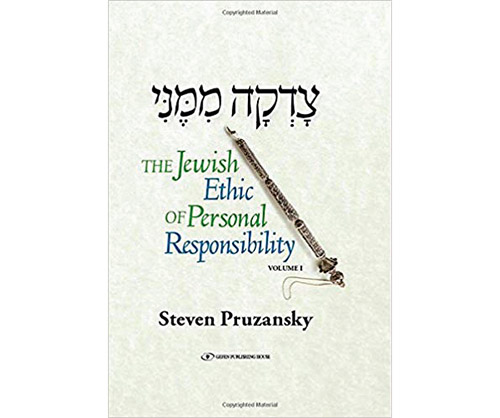
Reviewing “Tzadka Mimeni: The Jewish Ethic of Personal Responsibility,” by Rabbi Steven Pruzansky. Gefen Books. 2018. 320 pages. ISBN-13: 978-9652296498.
The order of the nesi’im, the tribal princes in the desert, teaches us the single most important lesson in life. Rashi (Num. 7:11) says that Moshe was not sure whether the twelve nesi’im should offer their sacrifices in order of the birth of their tribal ancestors, the twelve sons of Yaakov, or in the order of their marching in the desert. God answered that they should follow the order of the marching. In this easily overlooked technical comment, Rabbi Steven Pruzansky, in his recently published second volume of “Tzadka Mimeni: The Jewish Ethic of Personal Responsibility,” sees a fundamental truth. Your actions are much more important than your pedigree. Your ancestors made your past but you make your future.
This constitutes a basic concept of Western society and also the fundamental principle of the Torah’s commandments—the ability to choose your own destiny. “I have set before you life and death, the blessing and the curse; therefore choose life, that you may live” (Deuteronomy 30:19). With this right to choose our own paths comes the responsibility for that decision. When we choose well we prosper in the broadest sense of the word and when not, we suffer the consequences of our own making. The responsibility thrust upon each and every one of us in the modern world can be overwhelming. Yet the power of choice is a testament to the importance of each person, emblematic of the individual’s divine image.
Rabbi Pruzansky has emerged as a powerful voice for personal responsibility. His provocative essays and lectures instruct an embattled people to fight the forces of distraction and deflection. We must not blame others for our failed choices nor for our failure to choose. We are better than that; we are made in God’s image; we are God’s chosen people. By blaming others we diminish ourselves, our independence and our strength to overcome adversity.
Rabbi Pruzansky’s book is named in Hebrew, Tzadka Mimeni, Yehuda’s famous confession that Tamar was right and he was wrong. By submitting, Yehuda showed courage and character—he accepted responsibility for his actions. This serves as Rabbi Pruzansky’s model for his readers. In every weekly Torah portion, he highlights messages of personal responsibility in the text and commentaries.
The book’s concept is extremely important today. When a key Torah message falls out of style, we must emphasize it, pointing out the imperative to overcome society’s negative influence in this respect. The necessity of hard work, personal integrity, sacrifice and brutal honesty emerge from every weekly Torah portion in the hands of this able commentator. Rabbi Pruzansky uses classical, modern and Chassidic commentaries to tease out his message, but most of all he bases his interpretations on religious zionist thinkers of the past century. This facet adds value to the American reader who often lacks awareness of recent Israeli commentators.
The author could be forgiven for his occasional lapse into homiletics. A rabbi who preaches every week will struggle to resist the temptation to include some of his best sermons in a book of biblical insights. But I think Rabbi Pruzansky has a more profound intent. A philosophy based on personal responsibility could easily devolve into self-obsession. If I focus on my need to stand up and take control to the best of my ability, I risk thinking solely of myself. Personal responsibility must be accompanied with a personal ethic, with a powerful obligation to others accompanied by a sense of perspective and humility.
For that reason, Rabbi Pruzansky combines his call for greater personal responsibility with an emphasis on chesed, Kiddush Hashem and recognition of our place as servants in God’s world. In the agrarian society of the ancient world, the Torah places the obligation of charity on the individual farmers, who would leave the corners of their fields (and more) for the poor to come and take. This raised the individual farmer who saw and helped those in need, creating not just a financial but also a personal connection.
We are commanded to “do what is upright and good” (Deuteronomy 6:18). Ramban famously teaches that this addresses the perennial problem that rules can be distorted, allowing for indecent behavior within the law. This is a misunderstanding. Rabbi Pruzansky explains that the Torah teaches us “613 principles that are designed to engender in us ethical sensitivity to our surroundings.” The prejudices and biases of our imperfect personalities may point us in the wrong direction.We are easily influenced by cultural trends. Therefore, the Torah commands us to do “what is upright and good in God’s eyes,” not just in our own opinions.
The blaspheming son of a mixed Jewish-Egyptian marriage is said to have “went out” (Leviticus 24:10). Rashi quotes three midrashic opinions, each of which indicates the ease by which someone aggrieved can end up mocking everything that is sacred. Even when we are legitimately disgruntled—unhappy with our lot in life or our treatment by others—we must be wary of allowing that to affect our relationship with God. We must guard ourselves from falling down the path from disappointment to spiritual self-destruction.
We were created as actors in this world, charged with a divine mission. Each of us can accomplish great things by following the Torah’s direction. This commentary offers weekly opportunities to strengthen our resolve to become better and stronger Jews.
By Rabbi Gil Student
Rabbi Gil Student is editor of TorahMusings.com.










